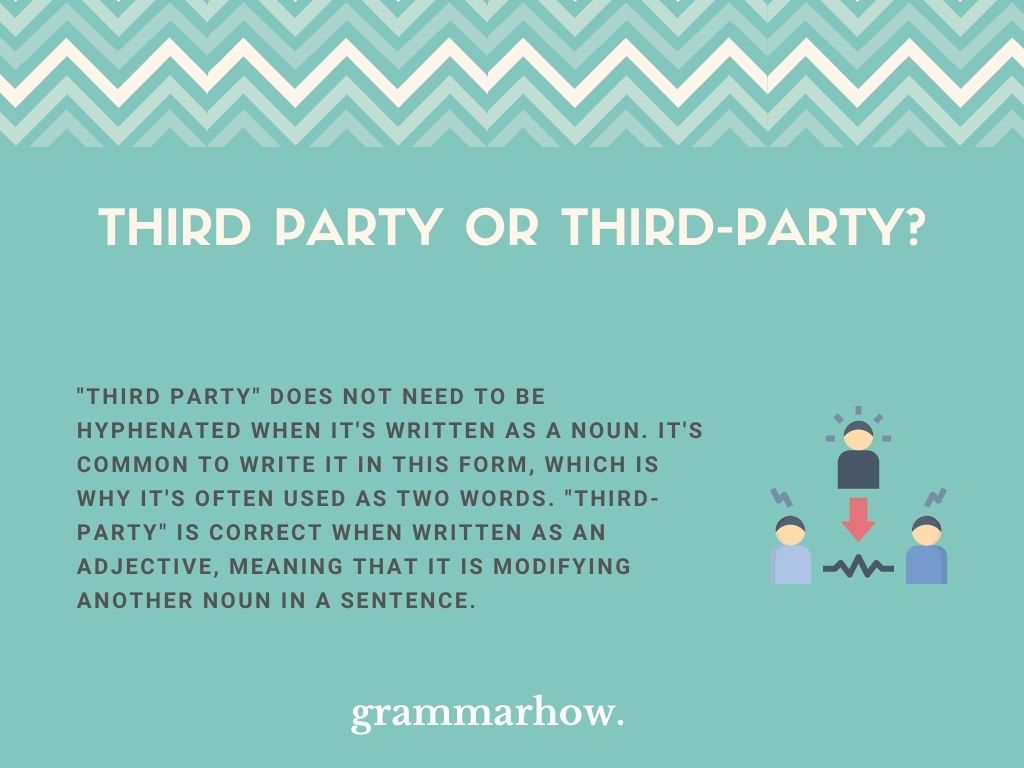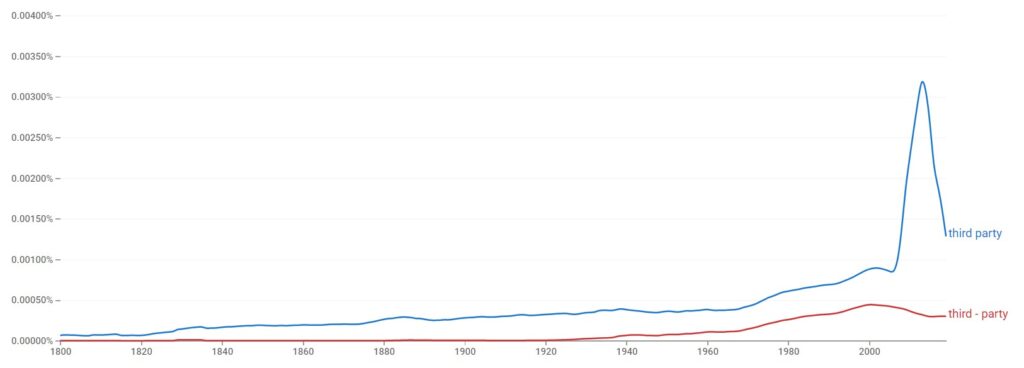We can use “third party” as both a noun and an adjective. Therefore, it would be helpful to know whether to write it as one or two words. It can be written as a hyphenated phrase as well, and this article will help you with it.
Third party vs. Third-party
“Third party” does not need to be hyphenated when it’s written as a noun. It’s common to write it in this form, which is why it’s often used as two words. “Third-party” is correct when written as an adjective, meaning that it is modifying another noun in a sentence.

According to Google Ngram Viewer, “third party” is the most popular choice. However, “third-party” is also used quite a lot, which shows that there is nothing grammatically correct with either choice.

In The Cambridge Dictionary and The Oxford Dictionary, “third party” is the most recognized spelling variation. It’s written as a phrasal noun in both dictionaries, which is why the hyphen isn’t needed.
Both dictionaries also recognized the adjective form of “third-party.” It has a slightly different definition in both cases because it’s an adjective, but we can use it as a hyphenated word when it modifies another noun.
If you don’t know where the differences between adjectives and nouns lie, you might benefit from the following:
- Adjective: I would like to visit a third-party commissioner before signing this.
- Noun: We need to consult the third party that is involved in this.
Third party
“Third party” is a noun. We use it as the main object of a sentence, and it is always written as two words in this case. The hyphen is unnecessary when using the noun form because everyone already understands the definition of “third party” as two words.
There is never a reason to hyphenate the noun form of “third party.” It’s a common English phrase, meaning that every native speaker already understands the meaning of the words without a hyphen between them.
Perhaps these examples will clear some things up:
- We need to talk to the third party again because they’ll have more information.
- Why don’t we get a third party involved in this one?
- The third party has already signed off on the documents, so we can move to the next step.
- Most of our products are sold by third parties, and we just take the profits whenever they come our way.
As a noun, there is no need to hyphenate the phrase. It works well to describe outsourcing to a third person or company, which is why it’s a suitable noun.
Third-party
“Third-party” is an adjective. We hyphenate the two words when they both work to modify another noun in a sentence. Usually, the noun comes directly after the adjective, which helps to highlight what is being modified and why the hyphen is important.
AP Style rules teach us that hyphens are necessary whenever more than one word makes up an adjective. To help the reader with their understanding, we must include hyphens to show that two or more words are changing the meaning of another noun.
AP Style is one of the most common writing styles in English. Therefore, it’s a good idea to keep up with the rules provided by it. Hyphens are a big part of getting it right.
Here are a few examples to show you how it works:
- The third-party programs they have installed have made it much harder to hack.
- I haven’t got the third-party contracts yet, but I’m still waiting for them.
- Do you have any third-party companies on the line that might be able to assist you?
- Our third-party suppliers actually help to keep our costs down.
All of the examples above show the noun coming directly after “third-party.” This helps to show how adjective-based modification works, and it should make it clearer what we’re looking for when writing the hyphenated form.
Is “Party” Capitalized In The Word “Third-Party”?
“Third-party” is not a proper noun. Therefore, you should not need to capitalize it at any point (unless it starts a sentence). However, you might find it useful to capitalize it when it’s part of a title, providing that you capitalize every other word in the title first.

Martin holds a Master’s degree in Finance and International Business. He has six years of experience in professional communication with clients, executives, and colleagues. Furthermore, he has teaching experience from Aarhus University. Martin has been featured as an expert in communication and teaching on Forbes and Shopify. Read more about Martin here.
